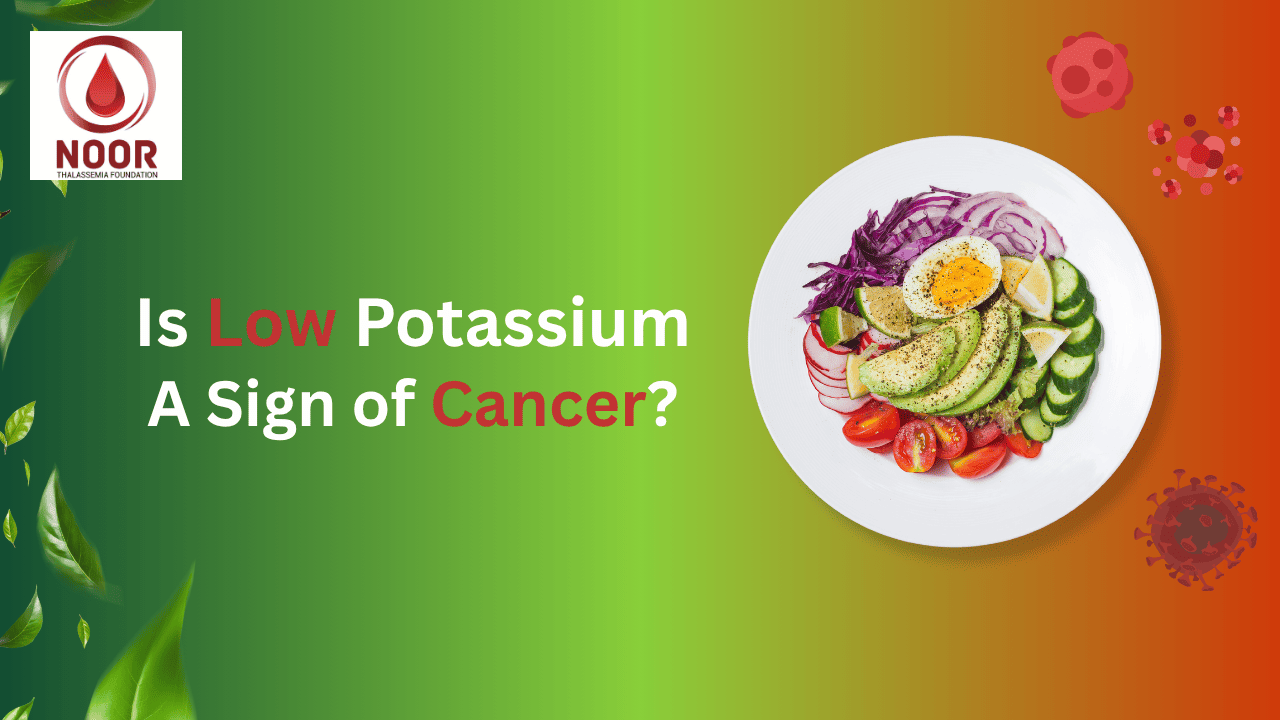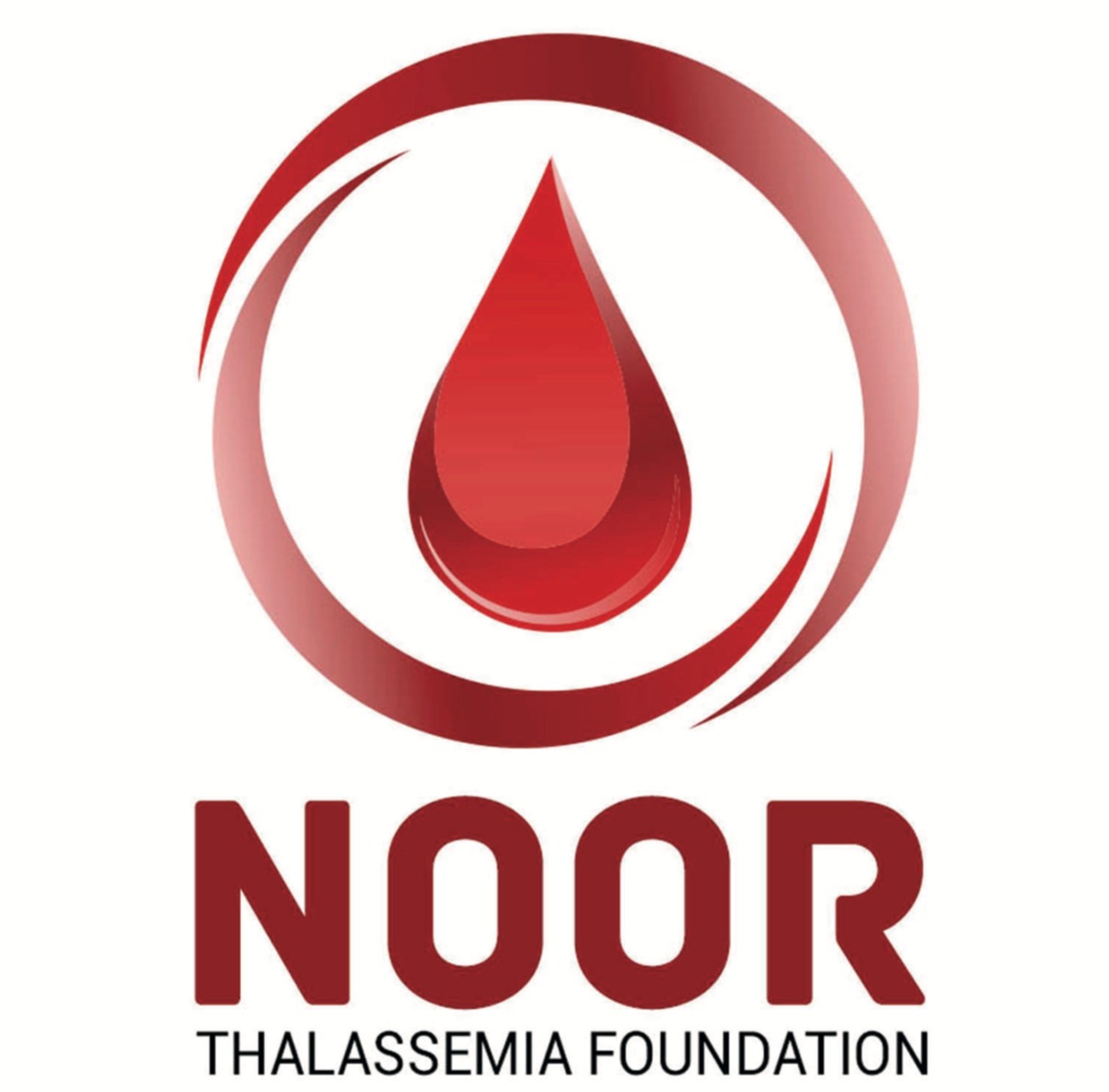Is Low Potassium a Sign of Cancer?
23-Jul-2025

Discover how potassium deficiency affects the body, its symptoms, ECG impact, and foods to avoid. Learn how Noor Thalassemia Foundation helps patients for free.
Potassium, as an essential electrolyte, plays an integral part in maintaining various bodily functions, such as muscle contraction, nerve function, and fluid balance. A lack of potassium—hypokalemia—can result in various health complications, one such issue being cancer risk. We will explore this subject here along with possible symptoms associated with low potassium and the foods to avoid, as well as its impacts on health, in this article.
What is Low Potassium?
Low Potassium Hypokalemia occurs when potassium levels in your blood fall below their ideal ranges, which are essential to normal cell functioning, and it’s lack can pose serious health problems. Signs and symptoms of low potassium can range from mild to severe fatigue, weakness, muscle cramps, and heart palpitations—potentially serious consequences!
Can Low Potassium Be a Sign of Cancer?
While potassium levels alone do not indicate cancer directly, cancer patients who undergo chemotherapy drugs could experience decreased potassium levels as a side effect of therapy; chemotherapy drugs often induce vomiting and diarrhoea that lead to electrolyte loss—including potassium. Furthermore, certain cancer types affecting the GI tract or kidney can have a direct influence over potassium levels.
It’s important to understand that low potassium levels are not a direct sign of cancer. If you're concerned about this issue, it's best to consult a medical professional for an accurate diagnosis and appropriate treatment options
Common Symptoms of Low Potassium
Fatigue and Weakness
A primary symptom of low potassium is fatigue. Because potassium plays an essential role in muscle health, low levels may result in muscle weakness as well as general tiredness.
Muscle Cramps and Spasms
Potassium helps your muscles contract and relax properly; when its levels fall too low, this could result in cramps, spasms, or weakness forming within them, especially within legs.
Irregular Heartbeat (Arrhythmia)
Potassium plays an essential part in maintaining electrical activity of the heart. Low potassium levels may result in arrhythmia, leading to heart palpitations or irregular heartbeat, leading to arrhythmia that causes irregular heartbeat or palpitations symptoms.
Nausea and Vomiting
Low potassium can lead to nausea and vomiting, further contributing to electrolyte imbalance.
Constipation
Low potassium can also have adverse effects on the muscles of the digestive system and lead to constipation.
What is a Low Potassium Diet?
A low-potassium diet refers to any eating plan that restricts intake of foods rich in potassium. Such plans are commonly recommended by healthcare practitioners for individuals suffering from kidney disease or heart conditions or at risk of them, or who wish to lower risk factors associated with developing them in the future. Furthermore, individuals living with thalassemia or cancer may require this kind of restriction in certain situations in order to control symptoms or complications that arise as part of treatment for such conditions.
Foods to Avoid on a Low-Potassium Diet
A key element of maintaining a diet with limited potassium consumption is restricting consumption of high-potassium foods, like those listed here:
Bananas
Bananas are famously high in potassium, so they should be avoided if you are on a low potassium diet.
Potatoes
Potatoes, particularly when eaten with the skin, are another high-potassium food. Opt for lower potassium vegetables like carrots or zucchini instead.
Tomatoes
Tomatoes are rich in potassium and should be limited in a low potassium diet, including tomato-based sauces and soups.
Leafy Greens
Leafy greens like spinach, kale, and Swiss chard are also high in potassium and may need to be limited depending on your potassium levels.
Dried Fruits
Dried fruits such as raisins, apricots, and dates are packed with potassium and should be avoided.
Nuts and Seeds
Nuts and seeds are potassium-rich foods, and while they are healthy, they can be problematic on a low potassium diet
Low Potassium Diet for Renal Patients
Patients suffering from kidney disease frequently need a low-potassium diet, as their kidneys have limited ability to filter excess potassium out of the bloodstream, potentially leading to dangerously elevated potassium levels, known as hyperkalemia, which may result in arrhythmias in heartbeat.
Managing Potassium Intake
Dialysis patients need to closely manage their potassium consumption through diet plans designed for lower potassium intake. Healthcare providers may suggest foods that contain less potassium while advising against those that could raise levels further.
Meal Plan for Kidney Patients
A low-potassium meal plan for kidney patients might include apples, cauliflower, green beans, and rice to provide essential nutrition without placing strain or raising potassium levels too quickly.
Can Low Potassium Cause Seizures?
Hypokalemia has serious negative consequences on the body, including increased risks of seizures. Potassium plays a vital role in nerve health; any imbalance can create neurological issues and may trigger seizures, as it impacts electrical activity in the brain, causing seizures to happen more regularly than necessary. Therefore, it's critical that potassium levels be regularly checked and any deficiencies addressed promptly to avoid serious side effects on health and life.
Electrocardiography, or ECG testing, measures electrical activity within the heart. Low potassium levels can create noticeable changes to an ECG, such as inverted T waves or the appearance of U waves that indicate decreased electrical activity in your system.
The ECG and Low Potassium
An electrocardiogram may reveal signs that someone has low potassium. Alterations to their heart's electrical patterns could serve as an early indicator for this deficiency and allow healthcare providers to make appropriate treatment decisions more quickly.
Diagnosis and Treatment
Accurate diagnosis is critical in order to identify effective therapies, whether that means blood tests to confirm potassium levels or further evaluation to uncover root causes of low potassium. Treatment often includes taking potassium supplements or making changes in one's diet.
NoorTF Plays an Important Part in Treating Low Potassium Levels and Related Conditions:
Noor Thalassemia Foundation (NoorTF) works tirelessly to provide free medical treatments to people suffering from blood disorders like thalassemia, hemophilia, and cancer. Many patients, particularly those experiencing renal issues or treatments that cause low potassium levels, may need extra support in managing electrolyte imbalances like low potassium. NoorTF's goal is to provide top-quality care—including managing low potassium levels as necessary—to those in need.
Noor Thalassemia Foundation relies on generous donors' support in order to continue providing essential healthcare services to underprivileged patients, making sure those in need receive the care and treatment they require.
How You Can Contribute
Donations made to the Noor Thalassemia Foundation provide crucial aid for patients suffering from life-threatening conditions like thalassemia. Your support allows Noor Thalassemia Foundation to fulfil its mission of bringing life-changing care and improving quality of life for underserved people in Pakistan, India, and across South Asia.
Frequently Asked Questions
1. What happens if my body lacks potassium?
A lack of potassium in your system may result in fatigue, muscle weakness, cramps, irregular heartbeats, and digestive problems—in severe cases even seizures could develop as a result.
2. Which beverages contain potassium?
Some examples of drinks high in potassium include orange juice, coconut water, and smoothies made with bananas or leafy greens.
3. How Long Will It Take for Potassium Deficiency to Heal?
Recovering from potassium deficiency typically takes from several days to weeks depending upon its severity and source, including taking potassium supplements or making lifestyle modifications such as changing my diet.
4. Can low potassium cause death?
In extreme circumstances, low potassium can cause fatal heart arrhythmias, seizures, or other serious medical problems that need immediate intervention to correct. So it is vital that any potassium deficiency issues be dealt with quickly in order to ensure health benefits.
5. What are the common causes of low potassium?
Excessive loss through vomiting and diarrhoea or use of certain diuretic medications like diuretics can contribute significantly to low levels. Other contributing factors can include kidney disease, malnutrition, or certain medical treatments.
6. How long will it take me to recover from low potassium?
This will depend on your medical situation; mild cases of low potassium can improve with appropriate treatments within days; more serious ones could take several months and necessitate hospitalization and intravenous potassium supplements
 +042 111 666 783
+042 111 666 783